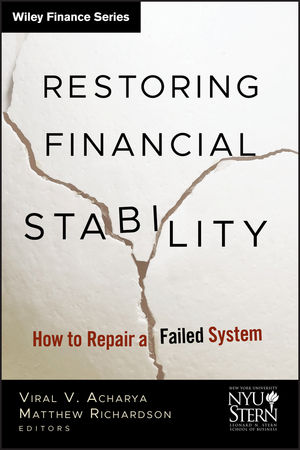|
Textbook
Restoring Financial Stability: How to Repair a Failed SystemISBN: 978-0-470-49934-4
Hardcover
416 pages
March 2009, ©2009
 This is a Print-on-Demand title. It will be printed specifically to fill your order. Please allow an additional 10-15 days delivery time. The book is not returnable.
|
||||||
"…ably tackles complex issues and covers a wide spectrum of the current debate, including the multiplicity of regulators, the need for international regulatory coordination, transparency, fair value accounting, compensation reform, and the extent to which monetary policy should address systemic asset bubbles." (The Investment Professional)
“…the book that best combines history, analysis and prescription is “Restoring Financial Stability”, a series of essays by academics at New York University’s Stern School of Business. The 60-page prologue is packed with telling facts and sophisticated analysis, and alone is worth the steep cover price. The individual chapters deal methodically with the myriad issues raised by the crunch, and the policy changes that will be needed, covering everything from the American mortgage market to the need for international cooperation in regulating finance." (The Economist)
"We are always better analysts with a 20/20 hindsight. Indeed, an ex post reading about events leading up to a crisis appears logical, and often leaves one with the question about why the evolution of the crisis could not be seen and corrected in time. Still, policy-makers know that such a review and understanding are important to learning from mistakes. Restoring Financial Stability (Wiley) acts as a catalyst to that understanding by offering a comprehensive sequencing of the causes and progression of the build-up of the financial strains that . . evolved into a full-blown global financial crisis. . . highly recommended even though bankers will remain bankers and will probably figure out ways to beat the new system." (Business Standard)
"This an excellent book. It is the first academic book to consider the crisis in depth and to propose policy responses and solutions. . . broad and deep overview of the crisis [that makes] suggestions for how to minimize the chances of a recurrence going forward. . . essential institutional detail and makes sensible and often original suggestions for reform. One of the remarkable aspects of the book is the speed with which it was produced. . . This book should be read by every serious observer of the crisis. It is an outstanding contribution."—Franklin Allen., Nippon Life Professor of Finance, Wharton School of the University of Pennsylvania in FinReg21.com
"The best available on this extraordinary and fascinating
subject. . . brilliant idea, superbly executed, and has first-class
content. Buy it."
—VoxEu.org



